Text preview of this CV template:
This is a text-only preview - download the formatted Word file using the link above.
Chris Smith | CARE & SUPPORT WORKER
1234 The Street, Nottingham NG1 2DY | 0115 9123456 | chrissmith@aol.com
PERSONAL STATEMENT
I am an experienced Care & Support Worker currently based in a Neuropsychiatric care and treatment facility, assisting those affected by acquired brain injuries. I provide flexible care to out-patients and residents, delivering guidance and encouragement through physical and emotional support. I love my role and I am driven by the desire to make a real difference in the patients’ lives. However, having moved to Nottingham for family reasons, I am looking for a positon closer to home.
WORK HISTORY
Care & Support Worker
May 2014 – date | Arnot Hospital, Queen’s Road, Derby
Working within the Neuropsychiatric care and treatment facility, I assist residents and out-patients with both medical and welfare needs. My role includes:
- Creating care and support plans and carrying out appropriate risk assessments.
- Taking detailed and accurate records of patients’ progress and current/future needs.
- Working with the team to empower and support patients’ independence.
- Helping to create a stimulating and varied environment.
- Liaising with my colleagues, other professionals and family members, ensuring the best possible outcome for patients
Care & Support Worker April 2011 – April 2014
Bennets Hospital, King Street, Derby
In this role I worked on a specialist Ward for female personality disorder. Patients had highly complex needs and the Ward operated a DBT Based Model with Dedicated Psychology Input.
- I assisted patients with their welfare and medical needs, creating assessments and reporting to other key personnel as required.
- I supported other team members at all stages of service provision including admission, patient assessment, and inpatient implementation and discharge. At all times my focus was on the dignity and safety of the patients.
- This was an extremely demanding role at times which required strong, flexible mental aptitude and the ability to cope with sometimes physically demanding situations.
Care Worker April 2009 – March 2011
Sterling Care, Cardiff
In this role I visited clients in their own homes to provide care and support.
- I assisted with personal care activities such as washing and dressing.
- I helped clients with social activities to improve quality of life.
- I assisted clients with their medication.
- I prepared meals and drinks, and tried to make it easy for clients to have nutritious food when I wasn’t around (for example, by preparing meals in batches for them to heat).
- I carried out some light domestic duties.
EDUCATION
CertHE in Health Care Nursing Support Worker Education
University of South Wales 2009 – 2011
- The Fundamentals of Care and Professional Practice
- An Introduction to Evidence Based Practice
- Individual Professonal Growth
- Caring for the Adult Client (adult pathway)
GCSEs
Cardiff Comprehensive 2007
9 GCSEs grade C and above including Biology (A), English (B) and Maths (B).
INTERESTS
I love playing classical piano and have attained Grade 6 – however, I also love Boogie Woogie and Blues, and play regularly at community events. I enjoy being outdoors and often take my cycle on the trails when the weather permits, or return to my home country of Wales and head for a hike in the stunning Snowdonia National Park.
REFERENCES
My current and previous employers will all provide references on request.
Template details:
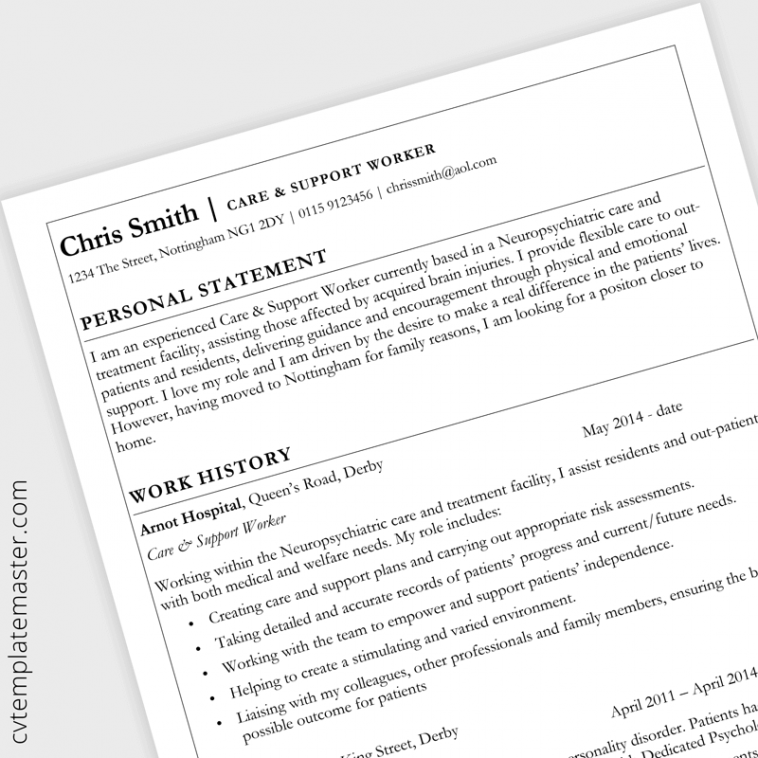
Here’s a full preview of this care support worker CV (page one):
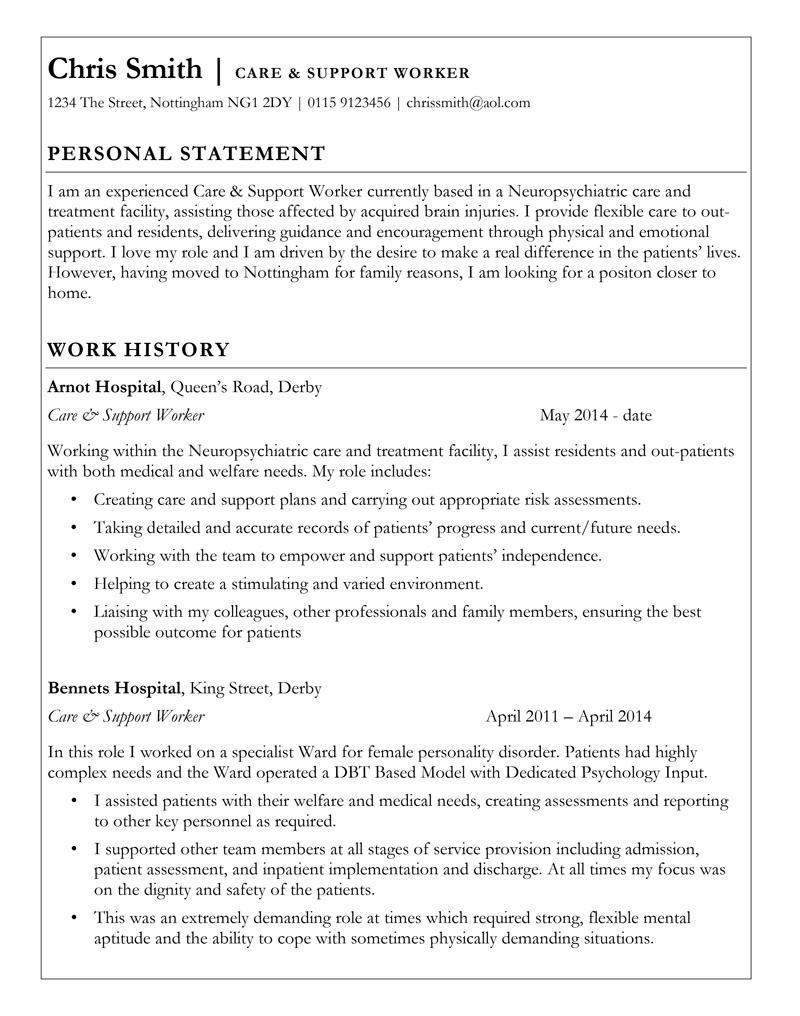
And here’s page two:
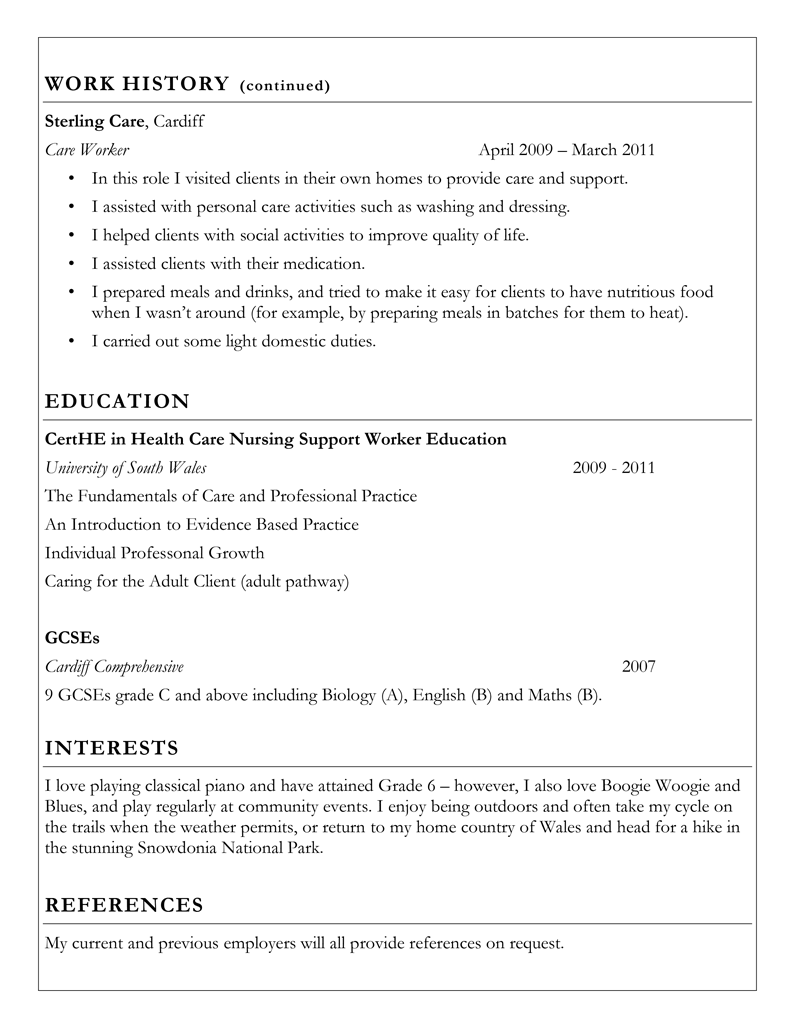
NB: This UK CV template was originally published on 10th February 2016 and has been completely updated for 2020.
Writing your care support worker CV: the difference between hard and soft skills
Having the right skills on your care support worker CV is the key to gaining an interview. But did you know there are two types of skills? If you’ve never heard of a hard or even soft skill, you are not alone. Read on to find out the difference between hard and soft skills and how you can improve your CV.
What is a hard skill?
Also known as a specific skill, a hard skill refers to anything that would typically require training or qualifications. For instance, computer programming or machine operation is a specific skill. The employer would usually request this skill on the job advert and you would need to hold it to apply.
So when it comes to a hard skill you can see that it would often be a vital part of the job. Only certain people who work in the industry and have trained and qualified would hold a particular skill. However, you would not typically need to train or gain a qualification for a soft skill.
Examples of hard skills for care support workers include:
- Ability to perform a care needs assessment
- Ability to administer medication
- Ability to perform basic tests such as taking blood pressure or measuring height & weight
- Ability to use patient software
- IT skills such as typing and using Microsoft software
- Ability to write neatly
You can immediately see that these skills are specific and measurable.
What is a soft skill?
There are two types of skills which are used every day in the work place. The first we’ve already discussed, which is a specific skill. But in order to use that skill to its full potential you would need to have a variety of strong soft skills.
A soft skill is what binds everything together and allows us to function within the workplace. Communication is a soft skill, and one of the most commonly used every day. Problem solving and time management are also soft skills. So you can see that the opposite of a hard or specific skill is something which we all use every day.
What soft skills are relevant to a care support worker CV?
Daily interaction between co-workers and customers requires a care support worker to develop and maintain a variety of soft skills. Certain soft skills are more important than others, and this is naturally very role and career dependant. For example, a journalist would require a very high level of written and verbal communication skills, whilst a project manager would make great use of organisation, problem solving, teamwork and time management. Care and support workers need a range of soft skills, including:
- Teamwork
- Communication
- Patience
- A positive, happy demeanour
- The ability to multitask
- The ability to think and make decisions quickly
- Being able to take responsibility
- Being a great listener
- Empathy and kindness
- Being willing to learn
- Being willing to go above and beyond
- Good attention to detail
It is hard to imagine how you could effectively carry out your role unless you possess all of the above skills to some degree. However, some of the skills, such as communication, the ability to multitask, thinking and making decisions quickly, and teamwork, will improve with experience.
How can I improve my soft skills?
Although there are courses which would help you to train certain skills, for the most part they are learned through experience and practice. For example, you could go on a training course to learn about administering medication, but you would need to practice in order to get better at communication.
Most of us learn and development soft skills from education, but don’t really get to put them into action properly until full time employment. This is where the development starts to begin through interaction and daily tasks.
What are the most common skills care employers look for?
Your CV must demonstrate both hard and soft skills if you want to get an interview. Hard skills can simply be listed, but demonstrating soft skills takes more creativity. The best way to show these is through practical examples of where you have used them. By presenting the employer with evidence of your performance, you are proving that you must have the relevant soft skills in order to achieve success.
To help you decide which soft skills to include on your CV,
(a) read the job profile and take note of anything the employer has mentioned specifically (see: How to tailor your CV to the role)
(b) review support worker job profiles to see what employers commonly look for. For example:
- Care Worker (National Careers Service)
- ‘The Role of a Care Support Worker’ (Stonebridge) which includes a list of sought after skills
- ‘The Different Roles of a Support Worker’ (SocialCare.co.uk) which may assist if you are moving from one type of support work to another
(c) Read more about the employer on their website and social media pages to find out more about their ethos, approach and the type of employees they look for
In addition to the skills mentioned above, employers in this industry generally value:
- Problem solving
- Time management
- Organisation
- Ability to build a rapport
- Building up a rapport
- Leadership (where applicable)
- Flexibility
Find out more: How to show soft skills on your CV
See more CV templates: In our Care and Nursing CV section
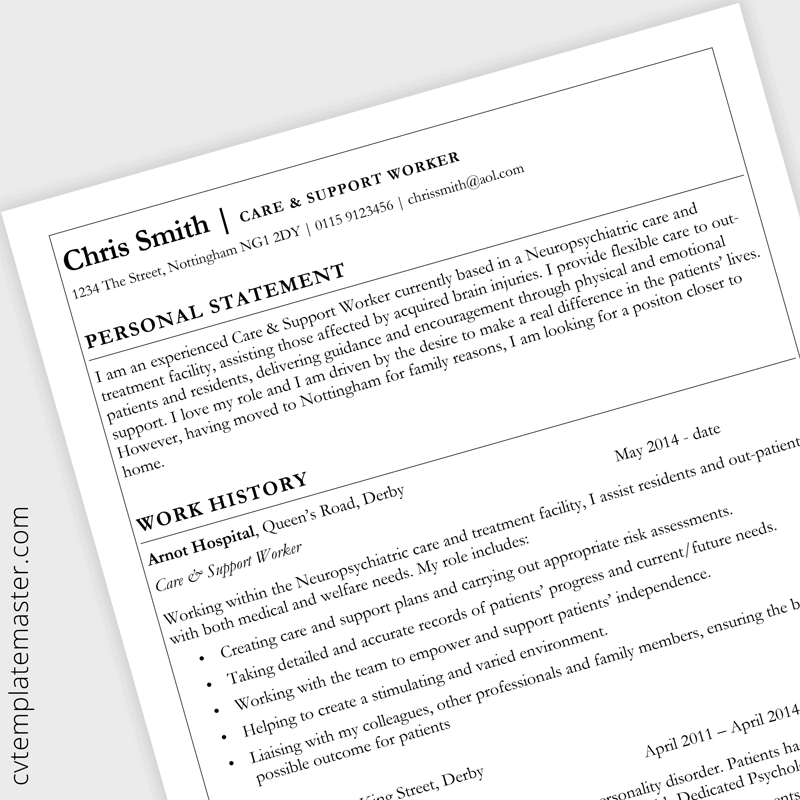
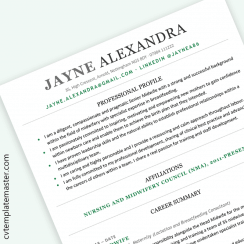
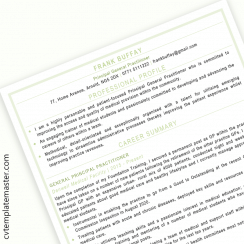
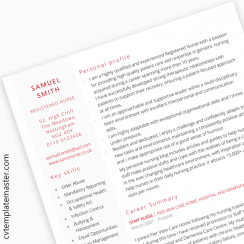
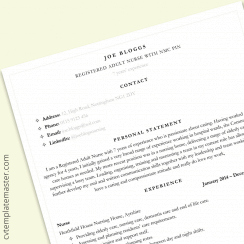
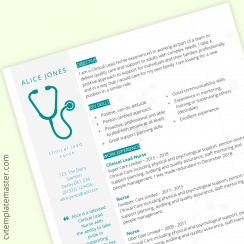
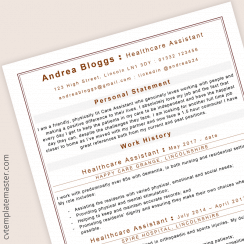
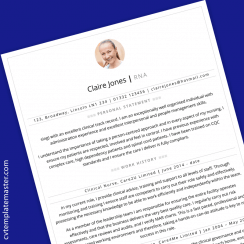
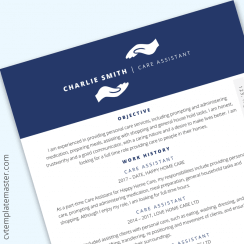
One of your best templates!
Wheres the download link of this template i can’t find
Hi there – where it says “Price: Free Download”, click the ‘Free Download’ part 🙂